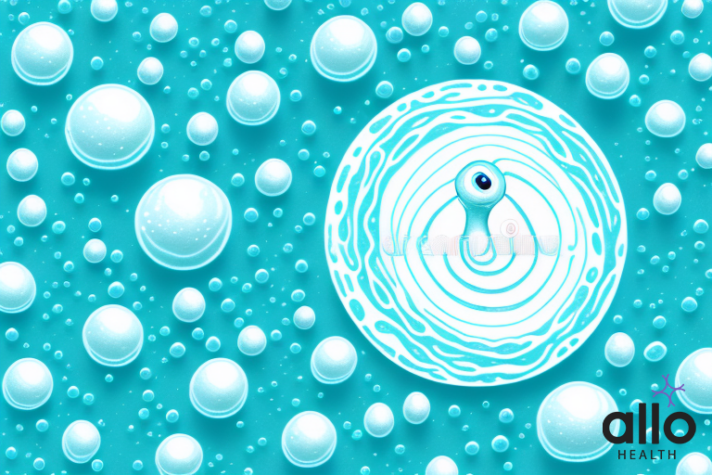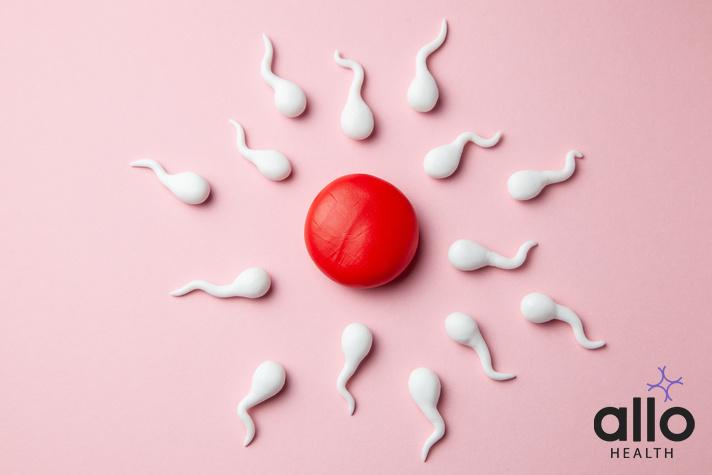Understanding The Link Between Watery Sperm and Premature Ejaculation

Allo Health is dedicated to personalized well-being, offering support and trusted information tailored to individual health goals. The platform emphasizes human-generated content, led by a distinguished medical team of experts, including physicians and sexual health specialists. Their commitment to credibility involves rigorous fact-checking, authoritative research, and continuous updates to ensure accurate, up-to-date information. Allo Health's unique approach goes beyond conventional platforms, providing expert-led insights and a continuous commitment to excellence, with user feedback playing a crucial role in shaping the platform's authoritative voice.

Dr.Sushma.V completed MBBS degree from BGS GIMS,bangalore
Why This Was Upated?
Our experts continually monitor the health and wellness space, and we update our articles when new information became available.
Updated on 18 March, 2024
- Article was updated as part of our commitment to diversity, equity, and inclusion.

"The following blog article provides general information and insights on various topics. However, it is important to note that the information presented is not intended as professional advice in any specific field or area. The content of this blog is for general educational and informational purposes only.
Book consultation
The content should not be interpreted as endorsement, recommendation, or guarantee of any product, service, or information mentioned. Readers are solely responsible for the decisions and actions they take based on the information provided in this blog. It is essential to exercise individual judgment, critical thinking, and personal responsibility when applying or implementing any information or suggestions discussed in the blog."
Have you been experiencing watery sperm and premature ejaculation? Are you concerned about the link between these two conditions? If so, you’re not alone. Many men struggle with these issues, but few understand the underlying causes and potential solutions. In this article, we’ll take an in-depth look at the connection between watery sperm and premature ejaculation. We’ll explore the science behind these conditions, lifestyle factors that may influence them, and natural and medical treatments that may help. So if you’re ready to gain a better understanding of your sexual health, let’s dive in.
What Is Watery Sperm?
Watery sperm or watery semen refers to semen that has a lower viscosity and appears more liquid than usual. Semen is composed of sperm cells and various fluids produced by the reproductive system’s accessory glands. The consistency and appearance of semen can vary among individuals and may be influenced by factors such as hydration, diet, overall health and frequency of ejaculation.
Several components contribute to the consistency of semen:
- Sperm cells: These are the reproductive cells produced in the testicles. They only form a small part of the semen, but they are crucial for fertilizing an egg during sexual reproduction.
- Seminal fluid: This is the liquid that nourishes and transports sperm. It is produced by the seminal vesicles, prostate gland, and bulbourethral glands. The fluid helps provide an optimal environment for sperm survival and motility.
- Prostate fluid: The prostate gland contributes a milky fluid to semen, containing enzymes, citric acid, and zinc. This fluid enhances sperm motility and plays a role in neutralizing the acidic environment of the vagina.
The consistency of semen can vary from thick to watery. Watery sperm may be a result of various factors, such as:
- Hydration: Dehydration can lead to a decrease in the volume of seminal fluid, making the semen appear more watery. Staying adequately hydrated is important for overall health, including reproductive health.
- Frequency of ejaculation: Frequent ejaculation can result in a lower concentration of sperm in semen, leading to a more watery appearance. However, this does not necessarily indicate a problem with fertility.
- Diet and lifestyle: Poor diet, smoking, excessive alcohol consumption, and certain medications can affect sperm quality and semen consistency.
- Age: As men age, the composition of semen may change, and it may become more watery. However, this is a natural part of the aging process.
While watery sperm is generally not a cause for concern, significant changes in semen consistency or quality may be worth discussing with a healthcare professional, especially if there are concerns about fertility. If a person is trying to conceive and faces difficulties, consulting with a fertility specialist can help identify any underlying issues and provide appropriate guidance.

Causes Of Watery Sperm
Watery sperm, or a more liquid consistency of semen, can be influenced by various factors. It’s important to note that minor changes in semen consistency are normal and can be influenced by temporary factors. However, if there are persistent concerns or changes, it’s advisable to consult with a healthcare professional. Here are some potential causes of watery sperm:
- Dehydration: Inadequate fluid intake can lead to dehydration, affecting the overall volume and consistency of seminal fluid. Staying hydrated is essential for maintaining reproductive health.
- Frequent Ejaculation: Regular ejaculation, whether through sexual activity or masturbation, can result in a lower concentration of sperm in semen. This may contribute to a more watery appearance. However, occasional variations in ejaculation frequency are normal.
- Age: As men age, the composition of semen may change, and the volume of seminal fluid may decrease. This can contribute to a more watery consistency. Aging can also impact sperm motility and overall reproductive function.
- Diet and Lifestyle: Poor dietary habits, including nutritional deficiencies, smoking, excessive alcohol consumption, and drug use, can affect sperm quality and semen consistency. A balanced diet rich in essential nutrients is crucial for reproductive health.
- Infections or Inflammation: Infections or inflammation of the reproductive organs, such as the prostate or seminal vesicles, can alter the composition of seminal fluid. This may result in changes to semen consistency.
- Medications: Some medications may affect reproductive health and semen quality. If you are taking medications and notice changes in semen consistency, it’s advisable to discuss this with your healthcare provider.
- Hormonal Imbalances: Imbalances in hormones, such as testosterone, can impact the production of sperm and seminal fluid. Hormonal issues may be associated with conditions like hypogonadism or other endocrine disorders.
- Genetic Factors: Genetic factors can play a role in semen consistency and overall reproductive health. Some individuals may naturally have a more watery or thicker semen consistency.
- Environmental Factors: Exposure to environmental toxins, pollutants, or radiation can potentially affect sperm quality and semen consistency.
It’s important to emphasize that minor changes in semen consistency are often normal and may not necessarily indicate a problem with fertility. However, persistent or significant changes, along with concerns about fertility, should prompt consultation with a healthcare professional or a fertility specialist. They can conduct a thorough evaluation, including medical history, physical examination, and, if necessary, laboratory tests to identify any underlying issues and provide appropriate guidance.
Link Between Watery Sperm and Premature Ejaculation
Watery sperm and premature ejaculation are two distinct aspects of male sexual health, and while they may share some common contributing factors, they are not directly linked. Let’s explore each of these aspects in detail:
- Watery Sperm:
- As mentioned earlier, watery sperm refers to the consistency of semen. It is influenced by factors such as hydration, frequency of ejaculation, age, diet, lifestyle, infections, medications, hormonal imbalances, and genetic factors.
- Watery sperm does not necessarily indicate a problem with fertility. However, if there are persistent changes or concerns about fertility, it’s advisable to consult with a healthcare professional for a thorough evaluation.
- Premature Ejaculation:
- Premature ejaculation (PE) is a common sexual dysfunction characterized by the uncontrollable and rapid onset of ejaculation, often occurring with minimal sexual stimulation and before the individual desires.
- PE can be influenced by psychological factors, biological factors, or a combination of both. Psychological factors may include anxiety, stress, or relationship issues, while biological factors can involve hormonal imbalances, neurotransmitter levels, or genetic predisposition.
- PE is not directly related to the appearance or consistency of semen. It is a separate issue related to the timing of ejaculation during sexual activity.
While watery sperm and premature ejaculation are distinct issues, they may share some common contributing factors related to overall reproductive health:
- Hormonal Imbalances: Hormonal imbalances can impact both semen consistency and sexual function. Testosterone, in particular, plays a crucial role in regulating both aspects of male reproductive health.
- Psychological Factors: Anxiety, stress, or performance-related concerns can contribute to both watery sperm and premature ejaculation. Addressing these psychological factors may have positive effects on sexual health.
- Lifestyle Factors: Poor lifestyle choices, such as an unhealthy diet, lack of exercise, or substance abuse, can negatively affect overall reproductive health and sexual function.
It’s essential to approach these issues individually and seek appropriate medical advice for each concern. If you are experiencing watery sperm, premature ejaculation, or any other sexual health issues, consulting with a healthcare professional, urologist, or a sexual health specialist is recommended. They can conduct a thorough assessment, consider relevant factors, and provide personalized advice or interventions based on your specific situation.
Medical Conditions That Cause Watery Sperm
Several medical conditions can contribute to changes in semen consistency, including making it more watery. It’s essential to note that occasional variations in semen characteristics are normal, but persistent changes may warrant medical attention. Here are some medical conditions that can potentially cause watery sperm:
- Infections of the Reproductive Tract: Infections in the reproductive organs, such as the prostate (prostatitis) or seminal vesicles, can alter the composition of seminal fluid, leading to changes in semen consistency.
- Sexually Transmitted Infections (STIs): STIs like gonorrhea or chlamydia can affect the reproductive organs and impact semen quality. Infections may lead to inflammation, influencing the texture and appearance of semen.
- Hormonal Imbalances: Hormonal disorders, such as hypogonadism or thyroid dysfunction, can disrupt the balance of hormones involved in sperm production. This imbalance may result in changes in semen consistency.
- Obstructive Azoospermia: Obstructive azoospermia occurs when there is a blockage in the reproductive tract, preventing the normal release of sperm. This condition can impact the composition of seminal fluid and contribute to watery semen.
- Retrograde Ejaculation: In retrograde ejaculation, semen is redirected into the bladder instead of being expelled through the urethra. This can occur due to nerve damage, certain medications, or surgical procedures, affecting semen volume and consistency.
- Testicular Disorders: Conditions affecting the testicles, such as orchitis or testicular atrophy, can impact sperm production and semen quality. Changes in the testicles may contribute to alterations in semen characteristics.
- Cystic Fibrosis: Cystic fibrosis is a genetic disorder that can affect the reproductive system, leading to the absence of the vas deferens. This absence may contribute to changes in semen consistency.
- Varicocele: A varicocele is the enlargement of veins within the scrotum, potentially leading to impaired sperm production and quality. It can influence semen characteristics, including its consistency.
- Medications and Treatments: Certain medications, such as those used in chemotherapy or radiation therapy, can impact sperm production and semen consistency. Discussing potential side effects with healthcare providers is crucial.

If an individual notices persistent changes in semen consistency or has concerns about fertility, it is advisable to seek medical advice. A healthcare professional, particularly a urologist or reproductive endocrinologist, can conduct a thorough evaluation to identify any underlying medical conditions and provide appropriate guidance or treatment.
Treating Watery Sperm
The treatment of watery sperm depends on the underlying cause. If an individual is concerned about changes in semen consistency, it’s crucial to consult with a healthcare professional for a comprehensive evaluation. Here are potential approaches based on the causes:
- Addressing Infections: If infections are identified (e.g., prostatitis or reproductive tract infections), antibiotics may be prescribed to eliminate the infection and restore normal reproductive function.
- Hormonal Therapy: Hormonal imbalances impacting sperm production may be addressed through hormone replacement therapy. Testosterone replacement or other hormonal medications can help restore hormonal balance.
- Managing Obstructive Azoospermia: Surgical interventions may be considered for obstructive azoospermia. Procedures like vasectomy reversal or removal of blockages can potentially restore normal sperm flow.
- Treating Retrograde Ejaculation: Medications and techniques to improve bladder sphincter function may be used to address retrograde ejaculation. In some cases, assisted reproductive techniques like intrauterine insemination (IUI) or in vitro fertilization (IVF) may be recommended.
- Managing Testicular Disorders: Treatment of testicular disorders may involve addressing the underlying cause, managing symptoms, and potentially exploring assisted reproductive technologies if fertility is a concern.
- Cystic Fibrosis Management: Individuals with cystic fibrosis may receive supportive care to manage symptoms. In cases where fertility is impacted, assisted reproductive technologies, including sperm retrieval and IVF, may be considered.
- Varicocele Treatment: Surgical procedures or embolization may be recommended to address varicoceles, potentially improving sperm quality and semen consistency.
- Lifestyle Modifications: Adopting a healthy lifestyle, including a balanced diet, regular exercise, and avoidance of tobacco and excessive alcohol, can positively impact overall reproductive health.
- Medication Review: If medications are identified as potential contributors to watery sperm, healthcare providers may adjust the dosage, switch to alternative medications, or explore other treatment options with fewer impacts on fertility.
It’s essential to note that the specific treatment plan will depend on the individual’s medical history, the underlying cause of watery sperm, and their reproductive goals. Open communication with healthcare providers, including urologists or reproductive specialists, is crucial to developing an appropriate and personalized treatment approach.
In some cases, couples experiencing fertility concerns may be referred to fertility specialists who can provide additional guidance and explore fertility treatment options tailored to their specific situation.
Most Asked Questions
-
What causes watery sperm, and does it affect fertility?
Watery sperm can result from factors such as dehydration, frequent ejaculation, age, and lifestyle choices. While minor changes in consistency are normal, persistent concerns should prompt consultation with a healthcare professional. Watery sperm, on its own, doesn't necessarily indicate fertility issues.
-
Is there a link between watery sperm and premature ejaculation?
Watery sperm and premature ejaculation are distinct issues. Watery sperm pertains to semen consistency, while premature ejaculation involves the rapid onset of ejaculation during sexual activity. While they may share common contributing factors like hormonal imbalances and psychological stress, they are not directly linked.
-
How does age impact watery sperm and premature ejaculation?
With age, semen consistency may become more watery, and premature ejaculation could be influenced by changes in hormonal levels. These are natural aspects of the aging process. While age-related changes are common, persistent concerns should be discussed with a healthcare professional.
-
Can lifestyle choices affect watery sperm and premature ejaculation?
Unhealthy lifestyle choices, such as a poor diet, lack of exercise, and substance abuse, can negatively impact both semen consistency and sexual function. Making positive lifestyle changes may have beneficial effects on overall reproductive health.
-
Is there a cure for premature ejaculation, and can it be prevented?
Premature ejaculation can be managed through various approaches, including behavioral techniques, medications, and counseling. Prevention may involve addressing underlying factors, such as psychological stress or hormonal imbalances. Seeking advice from a healthcare professional can help determine the most suitable approach for individual circumstances.






































